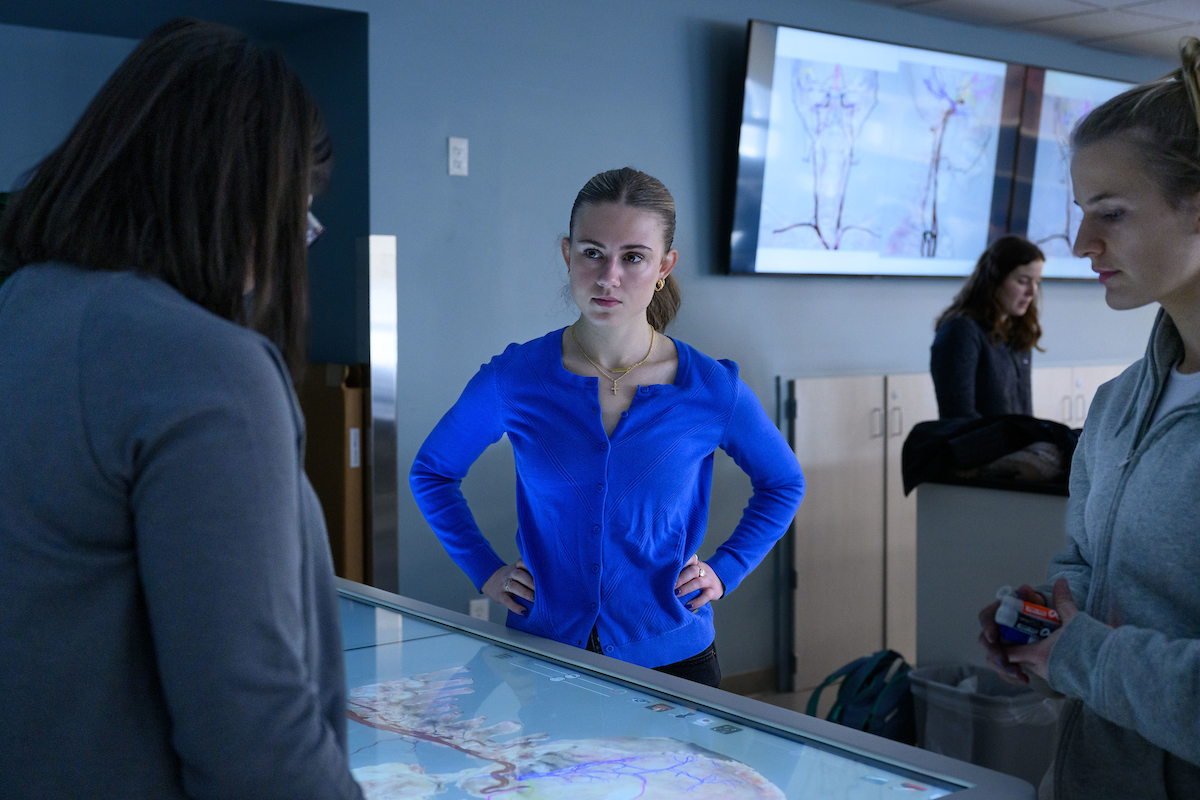Health Sciences

The ever-changing world of healthcare needs adaptable leaders with both compassion and clinical expertise.
Butler’s Health Sciences major is designed to prepare students specifically for healthcare contexts, placing graduates in an ideal position for advanced degree programs in medicine, PA school, clinically-focused masters programs, and similar paths.
The curriculum uniquely emphasizes how to navigate the modern healthcare system. The major has versatile applications, and Health Sciences majors see the full picture of how medical teams collaborate and function to provide excellent patient outcomes.
Students can expect to gain knowledge of Medicaid, insurance, medical ethics, human anatomy and physiology, whole-patient care, and more as they work toward their career goals.
Since Health Sciences students typically select the major to prepare them for advanced degrees, example occupations/industries include:
- Physician
- Physician Assistant (PA)
- Occupational or Physical Therapist
- Dentist
- Pathologist Assistant
- Anesthesiologist Assistant
Graduates can also pursue direct entry healthcare jobs or clinical research roles if they do not wish to continue their education. The Health Sciences faculty is here to help you determine what path might be right for you as you earn this versatile degree.
The undergraduate health sciences program blends basic sciences, health sciences, and healthcare-related courses to form an excellent foundation for students pursuing graduate programs in the healthcare field.
Visit the Health Sciences Bulletin for more information on the program.
The Medical Spanish concentration within the health science and healthcare and business majors would not add additional required hours for graduation, rather it would focus many elective choices into one area. The courses you choose for your concentration (from the list below) will contribute to your BSHS electives requirement.
Students pursuing this concentration must successfully complete:
- BSHS 481 Introduction to Medical Spanish
- BSHS 482 Advanced Medical Spanish
- BSHS 489 Spanish/English Medical Interpretation
- Plus any one of the following:
- BSHS 483 Medical Spanish Service Learning
- BSHS 484 Spanish Language Immersion Trip
- BSHS 285 Healthcare Immersion Abroad (when traveling to a Spanish speaking country)
Respiratory therapists are in higher demand than ever, and Butler students interested in the field begin with the Health Sciences Pre-Respiratory Therapy concentration.
This track ensures you complete the full year of prerequisite coursework needed before applying to Butler’s Bachelor of Science in Respiratory Therapy program set to launch in 2027. You’ll take hands-on science courses your first year in state-of-the-art labs and learn the skills needed to become a uniquely specialized healthcare professional.
Fall Semester
- Chemistry for Respiratory Therapists with Lab or equivalent
- Anatomy and Physiology 1 with lab or equivalent
- Medical Terminology or equivalent
- First Year Seminar (CORE)
- Statistically Speaking or equivalent or Elementary Statistics (CORE) or equivalent
- Well Being (CORE) or equivalent
Spring Semester
- Microbiology with lab or equivalent
- Anatomy and Physiology 2 with lab or equivalent
- First Year Seminar (CORE)
- Psychological Inquiry or equivalent (CORE)
- Perspectives in the Creative Arts (CORE)
The following courses are required to complete the Pre-Medicine Track:
- BI 325 Principles of Pathogenic Microbiology
- CH 351 Organic Chemistry I
- CH 352 Organic Chemistry II
- CH 361 Biochemistry I
- PH 107 Elementary Physics 1
- PH 108 Elementary Physics 2
The following courses are required to complete the Pre-PA Track:
- BI 325 Principles of Pathogenic Microbiology
- CH 351 Organic Chemistry I
- CH 352 Organic Chemistry II
- CH 361 Biochemistry I
The following courses are required to complete the Pre-Physical Therapy Track:
- KIN 323 Kinesiology
- KIN 324 Exercise Physiology
- PH 107 Elementary Physics 1
- PH 108 Elementary Physics 2
The following courses are required to complete the Pre-Occupational Therapy Track:
- KIN 323 Kinesiology
- PS 320 Life Span Development Psychology
- PS 441 Abnormal Psychology
The following courses are required to complete the Pre-Dentistry Track:
- BI 325 Principles of Pathogenic Microbiology
- CH 351 Organic Chemistry I
- CH 352 Organic Chemistry II
- CH 361 Biochemistry I
- PH 107 Elementary Physics 1
- PH 108 Elementary Physics 2
The following courses are required to complete the Pre-Optometry Track:
- BI 325 Principles of Pathogenic Microbiology
- CH 351 Organic Chemistry I
- CH 352 Organic Chemistry II
- CH 361 Biochemistry I
- PH 107 Elementary Physics 1
- PH 108 Elementary Physics 2

Graduates from this program will:
communicate with confidence
Facilitate effective discussions with laypersons and healthcare professionals on a variety of health-related topics.

Graduates from this program will:
stay informed
Locate, critically analyze, and apply data in a manner that supports evidence-based healthcare.

Graduates from this program will:
deliver solutions
Integrate knowledge and skills from natural, formal, and social sciences with healthcare fundamentals to solve complex problems and optimize health outcomes.

Graduates from this program will:
lead by example
Demonstrate ethical, professional, collaborative, and culturally-sensitive behaviors within the healthcare setting.

Looking for more information about what you can do with a Health Sciences degree?

